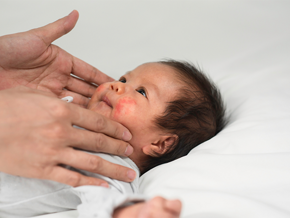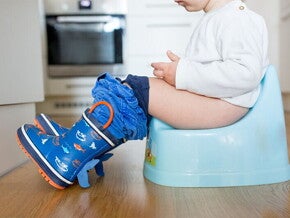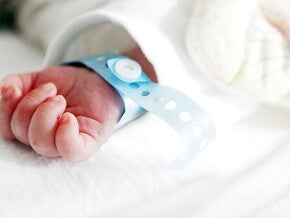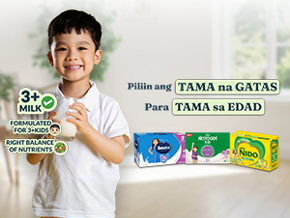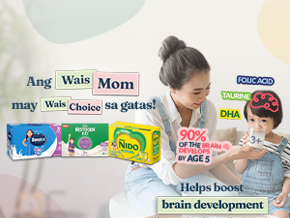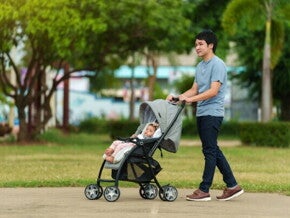
Dealing with colds in newborns can leave any parent second-guessing. Is it a regular cold or something more serious? After all, even as adults, we can't always tell either! This guide is here to give you clear answers. You'll learn to identify symptoms, use safe home treatments, and recognize when to call your pediatrician.
Why Newborns Are Susceptible to Colds
For the first few months, your baby benefits from passive immunity—antibodies you pass on during pregnancy. However, this protection is temporary and doesn't cover the more than 200 viruses that can cause the common cold.
A newborn's immune system is still developing, making them vulnerable to acute respiratory infections (ARIs). A 2024 study published in the journal BMC Pediatrics highlights that ARIs are the leading cause of mortality in children under 5, particularly in developing countries. That’s why it's crucial to take any respiratory illness seriously.
Typical Signs of Colds in Newborns
Your little one can't tell you in words that their nose is stuffy or their throat is scratchy. Learn to spot the symptoms of a cold early to help you comfort and care for your baby.
A stuffy or runny nose
Mucus may start clear and thin, then become thicker and change to yellow or even green over several days. This color change is a usual part of the infection-fighting process and doesn’t automatically mean the illness is worse.
Sneezing and mild coughing
Sneezing is a natural reflex to clear the nasal passages, while a mild cough helps clear mucus from the airways. These reflexes help your baby’s body clear the virus naturally.
Increased fussiness and altered sleep
Discomfort from congestion can make your baby more irritable than usual. They might have a harder time feeding, or their sleep schedule might be off.
How to Manage a Newborn’s Cold at Home
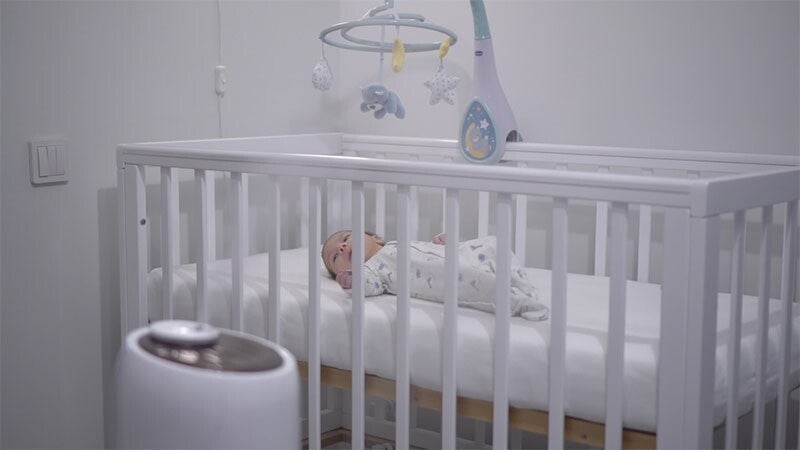
A cool-mist humidifier is a safe way to ease newborn cold symptoms.
With no cure for the cold virus, your focus should be on comfort while your baby’s body is doing the work. You should never give your newborn cold medicine. The U.S. Food and Drug Administration (FDA) warns that these products are not safe or effective for infants.
Instead, try these safe home remedies:
Use saline and suction to clear congestion
You can buy saline drops or spray at any pharmacy. Place a few drops into each nostril to thin the mucus, wait about a minute, then use a nasal aspirator or rubber bulb syringe to suction it out gently.
Add moisture to the air with a humidifier
The American Academy of Pediatrics (AAP) recommends using a cool-mist humidifier to help ease your newborn's congestion. It adds moisture to the air, which helps soothe your baby’s nasal passages and loosen congestion. Remember to use distilled water and clean the unit daily to prevent the growth of mold or bacteria.
Focus on hydration
Talk to your doctor about how to keep your baby well hydrated. WHO stresses that breast milk is the ideal food for infants, providing both hydration and antibodies that help protect against common childhood illnesses. If their nose is very stuffy, they may prefer smaller, more frequent feedings.
When to Call the Doctor
Most colds are mild and manageable at home. However, some symptoms may indicate a more serious condition, such as the flu, Respiratory Syncytial Virus (RSV), or another infection that requires urgent care. Seek medical help right away if your baby shows any of the following warning signs:
Your baby has a fever
For newborns and any baby under 2 months of age a rectal temperature of 38°C (100.4°F) or higher is an emergency. Call your pediatrician or go to the emergency room right away. Don’t give any fever-reducing medicine unless specifically instructed by a doctor.
Your baby is struggling to breathe
The signs of labored breathing include breathing much faster than usual, flaring their nostrils with each breath, audible wheezing, or retractions (the skin sucking in around the neck or between the ribs).
Your baby refuses to eat or shows signs of dehydration
If your baby is consistently refusing to feed, they're at risk of dehydration. According to the AAP, this could look like fewer than six wet diapers in a day, a lack of tears when crying, and unusual sleepiness.
Your baby is extremely lethargic or irritable.
A baby who is much sleepier than usual, difficult to wake, or inconsolably irritable may be showing signs of a more serious infection.
How to Help Prevent Future Colds
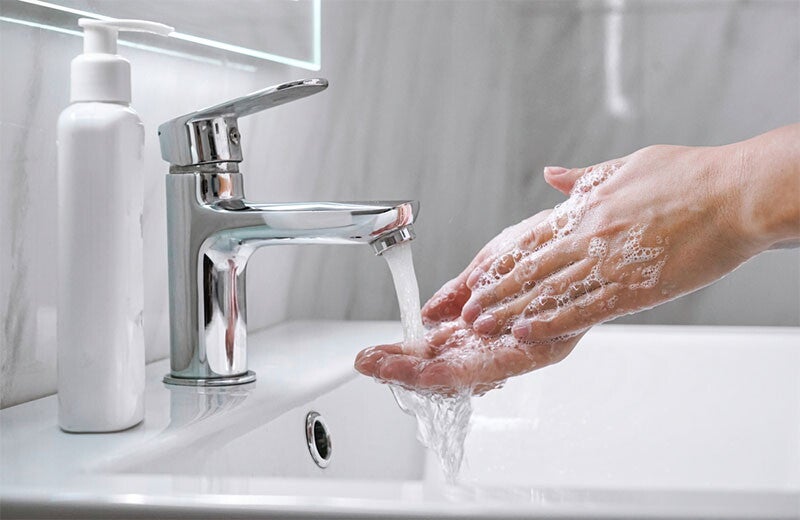
Shield your baby from future colds. Insist on frequent handwashing, stay up to date on your vaccines, and limit visitors who are sick.
Colds in newborns typically last seven to 10 days, though some symptoms, like a lingering cough or mild congestion, may stick around a little longer. Your baby is most contagious in the first few days they show symptoms, especially when they have a runny nose or sneeze often.
You’ll know your baby is on the mend when their feeding improves, they sleep more soundly, and nasal congestion starts to ease. Continue to offer comfort and hydration as they recover. You can’t prevent every illness, but you can significantly lower the risk.
- Insist on handwashing: Anyone who handles your baby should wash their hands thoroughly with soap and water first.
- Limit sick contacts: Politely ask friends and family with even mild cold symptoms to wait until they're healthy before visiting.
- Stay current on vaccinations: Make sure you and your family members are vaccinated against illnesses like the flu to help protect your newborn.
Managing colds in newborns is a learning experience. By focusing on comfort, providing safe care, and knowing the warning signs, you can confidently help your baby through it.
Got more questions? Connect with other parents on the ParentTeam Moms and Dads Facebook group and share your tips for managing colds in newborns.
References
Albrecht, Marie, Mirja Pagenkemper, Christian Wiessner, et al. "Infant immunity against viral infections is advanced by the placenta-dependent vertical transfer of maternal antibodies." Vaccine 40, no. 11 (2022): 1563–71. Accessed June 20, 2025. https://doi.org/10.1016/j.vaccine.2020.12.049
American Academy of Pediatrics. "Fever and Your Baby." HealthyChildren.org, July 19, 2021. Accessed June 20, 2025. https://www.healthychildren.org/English/health-issues/conditions/fever/Pages/Fever-and-Your-Baby.aspx
Cinicola, B., M. G. Conti, G. Terrin, et al. "The Protective Role of Maternal Immunization in Early Life." Frontiers in Pediatrics 9 (2021): 638871. Accessed June 20, 2025. https://doi.org/10.3389/fped.2021.638871
Cleveland Clinic. "Common Cold." Last reviewed February 7, 2023. Accessed June 20, 2025. https://my.clevelandclinic.org/health/diseases/12342-common-cold
Kollmann, T. R., et al. "Vertically Transferred Immunity in Neonates: Mothers, Mechanisms and Mediators." Frontiers in Immunology 11 (2020): 555. Accessed June 20, 2025. https://doi.org/10.3389/fimmu.2020.00555
Mayo Clinic Staff. "Sick baby? When to seek medical attention." Mayo Clinic, October 16, 2024. Accessed June 20, 2025. https://www.mayoclinic.org/healthy-lifestyle/infant-and-toddler-health/in-depth/healthy-baby/art-20047793
Mayo Clinic Staff. "Warm-mist versus cool-mist humidifier: Which is better for a cold?" Mayo Clinic, May 11, 2023. Accessed June 20, 2025. https://www.mayoclinic.org/diseases-conditions/common-cold/expert-answers/cool-mist-humidifiers/faq-20058199
U.S. Centers for Disease Control and Prevention (CDC). "Common Cold." Centers for Disease Control and Prevention. March 22, 2024. Accessed June 20, 2025. https://www.cdc.gov/common-cold/about/index.html











